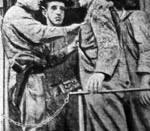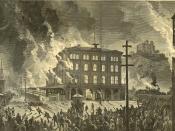"1877: The Grand Army of Starvation"
In 1877 an explosion of working-class protest rocked the United States and propelled the labor movement forward in the struggle for economic and social justice. Pittsburgh was at the center of this historic upsurge.
In the era of dramatic industrialization following the Civil War, the most powerful of the big business corporations were the railroad companies. In order to protect their profits during the economic depression that had begun in 1873, they companies had reduced the pay of railroad workers by ten percent. In 1877 they announced another ten percent reduction in the workers' pay, and also that railroad employees would be required to use company hotels when away from home, which meant a further reduction in real wages. On top of this, they decided to reduce the work-force - which meant unemployment for some and intensified labor for those remaining. It was an ideal policy for maximizing profits, but generated deep and fierce resentment among rail workers and their families, and also within the laboring population generally.
Workers became enraged a decided to strike, this idea spread quickly to other major cities.
The Great Railroad Strike of 1877, a national catastrophe and the major news story of the year, was the first national labor strike in U.S. history. Because of the ideological bias of the press, specifically its implicit commitment to capitalism and to objectivity, newspapers of the period could be expected to refrain from undermining the economic system in their coverage of the labor strike. An ideological approach predicted the strike, newspaper coverage would become increasingly hostile towards the trainmen as the strike develops, and then, to reincorporate dissident parties into the restored status quo, become less critical as the strike resolves. Newspapers language, labeling, and stereotyping in the headlines, news...



Comment
Wow.. I get to learn history today. Thanks to you. But I still dont quite understand gilden age....err..does it mean golden age or did I missed the meaning of gilden age in your essay?
1 out of 1 people found this comment useful.